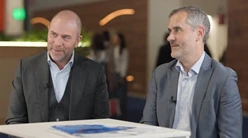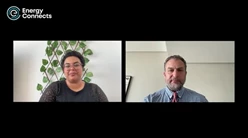Industry leaders see investment as key for long-term energy security
The chief executives from three major energy companies and a high-level minister from the United States zeroed in on energy security in a wide-ranging discussion at ADIPEC yesterday. They saw a clear link between security and investment in the oil and gas sector, and they broadly agreed on the critical need for more long-term capital investment.
The discussion opened with a question on the short-term outlook: will there be a glut in the oil markets in 2026? Their perspectives on why there would not be a near-term glut led them to express concern for regulatory regimes and investment.
Looking long term
James Danly, United States Deputy Secretary of Energy, put focus on the regulatory and policy framework rather than short term market forces.
“I don't think there's going to be glut,” he said. “But the most important thing is that markets are cyclical and you have waxing and waning supply and demand over time.
“The policies that should be enacted are deregulatory efforts to ensure that that price signals can be responded to over the long haul and that demand can be satisfied as nimbly as possible.
“So I'm actually less worried from a policy standpoint about the moment-to-moment market conditions or production rates, as whether the regulatory and policy framework is such that businesses can respond to market signals correctly.”
Claudio Descalzi, CEO, Eni, also did not see signs of oversupply in 2026.
“First of all, because in the last 12 years, we are investing half of what we need to invest to increase production,” he said.
“And we know that demand is increasing, and the supply is more or less there, but now in 2026 there is additional one million barrels. It's an average, but we are not investing enough.
“We have Guyana, we have Brazil. There is no other big project that can start producing.
“So we have demand increasing and we don't have enough supply and enough investment.
“I think that we have to be wise and attentive at what is happening. There is not enough investment.”
Not enough ploughed back
Tengku Muhammad Taufik, President and Group CEO, PETRONAS, also responded to concerns about long-term investment.
“Last year there was a number north of $3 trillion (of investment), almost two-thirds of that went to renewables and lower carbon.
“There's not been enough being ploughed back into the core fossil fuels and hydrocarbons, which form the backbone of our energy systems today, which will bring us to the subject of resilience.
“But this news of a glut, we have to take it with a pinch of salt,” he said.
Musabbeh Al Kaabi, CEO, Upstream, ADNOC, also saw market balance in the near term.
“There's a debate about next year's global economic growth,” he said. “Some are pessimistic, around 2%, but realistically it's around 3%.
“So as long as we maintain this growth, I think the demand continues to grow,” he said.
“It's debatable, some are at above one, some below one million barrels of oil per day.
“But I think that's the signal we see in the system, and I think that puts a responsibility on integrated energy producers like us because we need to maintain an acceptable level of investment.
“It's clear that the industry inherently is underinvesting, and the risk we're going to face, potentially, is the lack of investments to mitigate natural decline but also to meet the growing demand.
“It is going to be a challenge for this industry.”
Going up
The executives and energy minister largely agreed that the global demand signal for energy is upward. While the ceiling for this demand is uncertain, it clearly extends to electrification and industrial development.
This consensus led to much discussion of regulatory obstacles and the need for market forces to create price signals that can be apprehended and responded to.
“This will create the business case for investment that will eventually increase production and drive down costs,” said Danly.
He made the important point that secure energy is affordable energy. However, that does not mean cheap energy.
“Affordability and cheapness are not the same thing,” he said.
“The objective is to have people make rational, commercial decisions, both domestically and internationally, and over time the market will determine what the ultimate investment and returns are going to be.”





